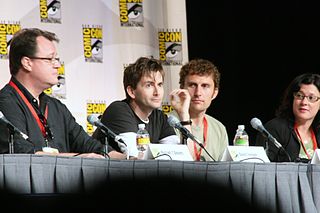 W
WDoctor Who is a British science fiction television programme produced and aired by the BBC since 1963.
 W
WSince Doctor Who was first broadcast in 1963, there have been a number of exhibitions of props, costumes and sets throughout the United Kingdom. Some have been intended to be permanent, and others seasonal; most have been staged at existing tourist locations.
 W
WThe first season of British science fiction television programme Doctor Who was originally broadcast on BBC TV between 1963 and 1964. The series began on 23 November 1963 with An Unearthly Child and ended with The Reign of Terror on 12 September 1964. The show was created by BBC Television head of drama Sydney Newman to fill the Saturday evening timeslot and appeal to both the younger and older audiences of the neighbouring programmes. Formatting of the programme was handled by Newman, head of serials Donald Wilson, writer C. E. Webber, and producer Rex Tucker. Production was overseen by the BBC's first female producer Verity Lambert and story editor David Whitaker, both of whom handled the scripts and stories.
 W
WThe second season of British science fiction television series Doctor Who began on 31 October 1964 with the story Planet of Giants and ended on 24 July 1965 with The Time Meddler. 37 of 39 episodes exist in the BBC archives; 2 episodes remain missing. As a result, only 1 serial is incomplete.
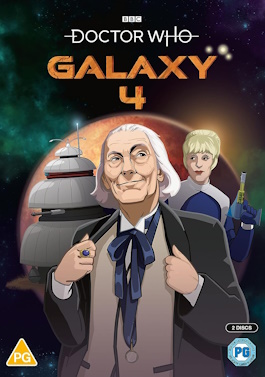 W
WThe third season of British science fiction television series Doctor Who began on 11 September 1965 with the story Galaxy 4 and ended on 16 July 1966 with The War Machines. Only 17 out of 45 episodes survive in the BBC archives; 28 remain missing. As a result, only 3 serials are complete.
 W
WThe fourth season of British science fiction television series Doctor Who began on 10 September 1966 with the 1st Doctor story The Smugglers and, after a change of lead actor part-way through the series, ended on 1 July 1967 with The Evil of the Daleks. For the first time, the entire main cast changed over the course of a single season. Only 10 out of 43 episodes survive in the BBC archives; 33 remain missing. No serials in this season exist in their entirety. However, The Tenth Planet, The Power of the Daleks, The Moonbase, The Macra Terror and The Faceless Ones have currently had their missing episodes reconstructed with animation and subsequently have been released on home media.
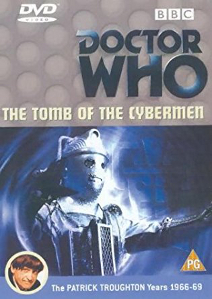 W
WThe fifth season of British science fiction television series Doctor Who began on 2 September 1967 with the first story of season 5 The Tomb of the Cybermen and ended on 1 June 1968 with The Wheel in Space. Only 22 out of 40 episodes are held in the BBC archives; 18 remain missing. As a result, only 2 serials exist entirely.
 W
WThe sixth season of British science fiction television series Doctor Who began on 10 August 1968 with the first story of season 6 The Dominators and ended Patrick Troughton's reign as the Doctor with its final story The War Games. Only 37 out of 44 episodes are held in the BBC archives; 7 remain missing. As a result, 2 serials are incomplete.
 W
WThe seventh season of British science fiction television series Doctor Who began on 3 January 1970 with Jon Pertwee's first story Spearhead from Space and ended with Inferno. The first season to be made in colour, it marked the beginning of Barry Letts's five seasons as series producer, but it has been described as "essentially devised" by his predecessor, Derrick Sherwin, who produced the opening story. The season sees the beginning of the Doctor's exile to Earth by the Time Lords and his attachment to UNIT as its scientific advisor.
 W
WThe eighth season of British science fiction television series Doctor Who began on 2 January 1971 with Terror of the Autons and ended with The Dæmons featuring Jon Pertwee as the Third Doctor.
 W
WThe ninth season of British science fiction television series Doctor Who began on 1 January 1972 with Day of the Daleks, and ended with The Time Monster.
 W
WThe tenth season of British science fiction television series Doctor Who began on 30 December 1972 with the tenth anniversary special The Three Doctors, and ended with Katy Manning's final serial The Green Death.
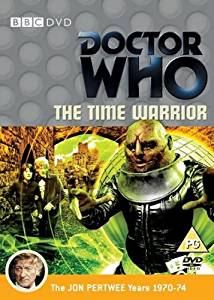 W
WThe eleventh season of British science fiction television series Doctor Who began on 15 December 1973 with the serial The Time Warrior, and ended with Jon Pertwee's final serial Planet of the Spiders. The season's writing was recognized by the Writer's Guild of Great Britain for Best Children's Drama Script.
 W
WThe twelfth season of the British science fiction television series Doctor Who began on 28 December 1974 with Tom Baker's first serial Robot, and ended with Revenge of the Cybermen on 10 May 1975.
 W
WThe thirteenth season of British science fiction television series Doctor Who began on 30 August 1975 with the story Terror of the Zygons, and ended with The Seeds of Doom.
 W
WThe fourteenth season of British science fiction television series Doctor Who began on 4 September 1976 with The Masque of Mandragora, and ended with The Talons of Weng-Chiang.
 W
WThe fifteenth season of British science fiction television series Doctor Who began on 3 September 1977 with the episode Horror of Fang Rock, and ended with The Invasion of Time.
 W
WThe sixteenth season of British science fiction television series Doctor Who, known collectively as The Key to Time, began on 2 September 1978 with The Ribos Operation, and ended with The Armageddon Factor. The arc was originally conceived by producer Graham Williams, who had proposed it as part of his application for the producer's job in 1976. The name refers to the powerful artefact, the segments of which are what the Fourth Doctor and his companions, Romana and K9, search for during the season.
 W
WThe seventeenth season of British science fiction television series Doctor Who began on 1 September 1979 with the story Destiny of the Daleks, and ended with The Horns of Nimon.
 W
WThe eighteenth season of British science fiction television series Doctor Who began on 30 August 1980 with the serial The Leisure Hive, and ended with Tom Baker's last story Logopolis.
 W
WThe nineteenth season of British science fiction television series Doctor Who began on 4 January 1982 with Castrovalva, and ended with Time-Flight.
 W
WThe twentieth season of British science fiction television series Doctor Who began on 3 January 1983 with the story Arc of Infinity, and ended 16 March 1983 with The King's Demons. A 20th Anniversary special, The Five Doctors, followed in November 1983.
 W
WThe twenty-first season of British science fiction television series Doctor Who began on 5 January 1984 with the 5th Doctor serial Warriors of the Deep, and ended with Colin Baker's first serial The Twin Dilemma. For only the second time, the entire TARDIS crew changed over the course of a single season.
 W
WThe twenty-second season of British science fiction television series Doctor Who began on 5 January 1985 and ended on 30 March 1985. It opened with the serial Attack of the Cybermen and ended with the serial Revelation of the Daleks. The season returned to the traditional Saturday transmission for the first time since Season 18, but for the first and only time in the series' first run it featured 45-minute episodes in its entirety. During transmission, BBC One controller Michael Grade announced an 18-month hiatus for the series, partly citing the violence depicted in the stories of the season.
 W
WThe twenty-third season of British science fiction television series Doctor Who, known collectively as The Trial of a Time Lord, aired in weekly episodes from 6 September to 6 December 1986. It contains four adventures: The Mysterious Planet, Mindwarp, Terror of the Vervoids and The Ultimate Foe. The season marks Colin Baker's final regular appearance as the Sixth Doctor.
 W
WThe twenty-fourth season of British science fiction television series Doctor Who began on 7 September 1987 with Sylvester McCoy's first story Time and the Rani, and ended with Dragonfire.
 W
WThe twenty-fifth season of British science fiction television series Doctor Who began on 5 October 1988. It comprised four separate serials, beginning with Remembrance of the Daleks and ending with The Greatest Show in the Galaxy. To mark the 25th anniversary season, producer John Nathan-Turner brought back the Daleks and the Cybermen. The American New Jersey Network also made a special behind-the-scenes documentary called The Making of Doctor Who, which followed the production of the 25th anniversary story Silver Nemesis.
 W
WThe twenty-sixth season of British science fiction television series Doctor Who began on 9 September 1989 with the serial Battlefield, after a regular series of four serials was broadcast finishing with Survival which was the final episode of Doctor Who to air before a 16-year absence from episodic television following its cancellation.
 W
WThe first series of the 2005 revival of the British science fiction programme Doctor Who began on 26 March 2005 with the episode "Rose". This marked the end of the programme's 16-year absence from episodic television following its cancellation in 1989, and was the first new televised Doctor Who story since the broadcast of the television movie starring Paul McGann in 1996. The finale episode, "The Parting of the Ways", was broadcast on 18 June 2005. The show was revived by longtime Doctor Who fan Russell T Davies, who had been lobbying the BBC since the late 1990s to bring the show back. The first series comprised 13 episodes, eight of which Davies wrote. Davies, Julie Gardner and Mal Young served as executive producers, Phil Collinson as producer.
 W
WThe second series of British science fiction programme Doctor Who began on 25 December 2005 with the Christmas special "The Christmas Invasion". Following the special, a regular series of thirteen episodes was broadcast, starting with "New Earth" on 15 April 2006. In addition, two short special episodes were produced; a Children in Need special and an interactive episode, as well as 13 TARDISODEs.
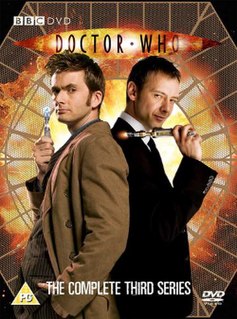 W
WThe third series of British science fiction programme Doctor Who was preceded by the 2006 Christmas special "The Runaway Bride". Following the special, a regular series of thirteen episodes was broadcast, starting with "Smith and Jones" on 31 March 2007. In addition, a 13-part animated serial was produced and broadcast as part of Totally Doctor Who.
 W
WThe fourth series of British science fiction television programme Doctor Who was preceded by the 2007 Christmas special "Voyage of the Damned". Following the special, a regular series of thirteen episodes aired, starting with "Partners in Crime" on 5 April 2008 and ending with "Journey's End" three months later on 5 July 2008.
 W
WThe 2008–2010 specials of the British science fiction television programme Doctor Who are five specials that linked the programme's fourth and fifth series. The specials were produced in lieu of a full series in 2009, to allow the new production team for the programme to have enough time to prepare for the fifth series in 2010, in light of Russell T. Davies' decision to step down as showrunner. The first special was broadcast on 25 December 2008 with "The Next Doctor", with the last special, the two-part episode "The End of Time", broadcasting over two weeks on 25 December 2009 and 1 January 2010.
 W
WThe fifth series of the British science-fiction television programme Doctor Who was originally broadcast on BBC One in 2010. The series began on 3 April 2010 with "The Eleventh Hour", and ended with "The Big Bang" on 26 June 2010. It was produced by head writer and executive producer Steven Moffat, who took over when Russell T Davies ended his involvement in the show after "The End of Time". The series has 13 episodes, six of which were written by Moffat. Piers Wenger and Beth Willis were co-executive producers, and Tracie Simpson and Peter Bennett were producers. Although it is the fifth series since the show's revival in 2005, the series' production code numbers were reset.
 W
WThe sixth series of British science fiction television programme Doctor Who was shown in two parts. The first seven episodes were broadcast from April to June 2011, beginning with "The Impossible Astronaut" and ending with mid-series finale "A Good Man Goes to War". The final six episodes aired from August to October, beginning with "Let's Kill Hitler" and ending with "The Wedding of River Song". The main series was preceded by "A Christmas Carol", the 2010 Christmas special. The series was led by head writer and executive producer Steven Moffat, alongside executive producers Beth Willis and Piers Wenger. Sanne Wohlenberg, Marcus Wilson, and Denise Paul served as producers. The series was the sixth to air following the programme's revival in 2005 after the classic era aired between 1963 and 1989, and is the thirty-second season overall.
 W
WThe seventh series of the British science fiction television programme Doctor Who was broadcast concurrently on BBC One in the United Kingdom, and was split into two parts as the previous series had been. Following its premiere on 1 September 2012, the series aired weekly with five episodes until 29 September. The remaining eight episodes were broadcast between 30 March and 18 May 2013. The 2012 Christmas special, "The Snowmen", aired separately from the main series and introduced a new TARDIS interior, title sequence, theme tune, and outfit for the Doctor.
 W
WThe 2013 specials of the British science fiction television programme Doctor Who are two additional episodes following the programme's seventh series. In addition to the traditional Christmas episode broadcast on 25 December 2013, a feature of the revived series since 2005, there was also a special celebrating the 50th anniversary of the programme broadcast on 23 November 2013, both airing on BBC One.
 W
WThe eighth series of the British science fiction television programme Doctor Who began on 23 August 2014 with "Deep Breath" and ended with "Death in Heaven" on 8 November 2014. The series was officially ordered in May 2013, and led by head writer and executive producer Steven Moffat, alongside executive producer Brian Minchin. Nikki Wilson, Peter Bennett and Paul Frift served as producers. The series is the eighth to air following the programme's revival in 2005, the thirty-fourth season overall, and the first series since series five not to be split into two parts.
 W
WThe ninth series of the British science fiction television programme Doctor Who premiered on 19 September 2015 with "The Magician's Apprentice" and concluded on 5 December 2015 with "Hell Bent". The series was led by head writer and executive producer Steven Moffat, alongside executive producer Brian Minchin. Nikki Wilson, Peter Bennett, and Derek Ritchie served as producers. The series is the ninth to air following the programme's revival in 2005, and is the thirty-fifth season overall.
 W
WThe tenth series of the British science fiction television programme Doctor Who premiered on 15 April 2017 and concluded on 1 July 2017 with twelve episodes, after it was formally announced in July 2015. The series is led by head writer and executive producer Steven Moffat, alongside executive producer Brian Minchin. It is the third and final series overseen by the two as executive producers, as well as Moffat's sixth and final series as head writer. This series is the tenth to air following the programme's revival in 2005, and is the thirty-sixth season overall.
 W
WThe eleventh series of the British science fiction television programme Doctor Who premiered on 7 October 2018 and concluded on 9 December 2018. The series is the first to be led by Chris Chibnall as head writer and executive producer, alongside executive producers Matt Strevens and Sam Hoyle, after Steven Moffat and Brian Minchin stepped down after the tenth series. This series is the eleventh to air following the programme's revival in 2005 and is the thirty-seventh season overall. It also marks the beginning of the third production era of the revived series, following Russell T Davies' run from 2005–2010, and Moffat's from 2010–2017. The eleventh series was broadcast on Sundays, a first in the programme's history, after regular episodes of the revived era have previously been broadcast on Saturdays. The series was followed by a New Year's Day special episode, "Resolution", instead of the traditional annual Christmas Day special.
 W
WThe twelfth series of the British science fiction television programme Doctor Who premiered on 1 January 2020 and aired through to 1 March 2020. It is the second to be led by Chris Chibnall as head writer and executive producer, alongside executive producer Matt Strevens, the twelfth to air after the programme's revival in 2005, and the thirty-eighth season overall. The twelfth series was broadcast on Sundays, except for the premiere episode, continuing on from the eleventh series, after regular episodes of the revived era have previously been broadcast on Saturdays. The series will be followed by the 2021 New Year's Day special, "Revolution of the Daleks".